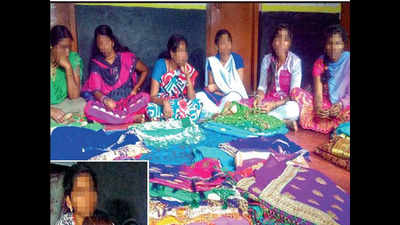- News
- City News
- bengaluru News
- Thayi too early: Teen moms suffer in these Karnataka villages
Thayi too early: Teen moms suffer in these Karnataka villages

She is not alone.A visit by TOI to Yelandur and Kollegala in Chamarajanagara district — activists say they have among the highest incidence of child marriage in Karnataka — revealed that most beneficiaries of the government’s Thayi Bhagya Scheme in these taluks are minors.
Officials are turning a blind eye to the widespread incidence of child marriage in certain districts in the state — with the problem being particularly worrisome in some taluks of Chamarajanagar district, where mothers who married as minors say the practice is widespread. Incidentally, in these areas, most beneficiaries of the government’s Thayi Bhagya Scheme — a comprehensive maternal healthcare programme for pregnant women launched in 2009 to reduce childbirth-associated mortality at a time when Karnataka had the highest maternal death ratio in the south — are minors or women who were child brides. Certainly, young mothers should not be deprived of assistance under the scheme. Just as surely, though, the Karnataka government, applauded by the Supreme Court for its 2017 amendment to the Prohibition of Child Marriage Act to automatically void child marriage, must do more than pass well-meaning legislation without effective implementation of existing laws that protect girls from becoming child brides.
In Yelandur, with 33 small villages and a population of 8,000, nearly one in two households has had a child marriage. TOI met about 20 girls who were either pregnant, or mothers of one or more children at the age of 16 or 17. And they all had Thayi cards, issued to help them and their offspring avail of various benefits under the mater nal healthcare programme.
“Nobody asks me my age when I go for health checkups as I have the Thayi card,” said Padma, 17, who is five months pregnant.
An official from the women and child development department’s Child Marriage Prohibition Cell, said it is mandatory for all officials and auxiliary nurse midwives (ANMs) to call the child helpline or the cell when they come across marriages of minors. ANMs, however, say they are only trying to do what is best for young mothers. “We know the actual age of all the girls who are married before 18 but face threats from their families not to state the age on record,” one auxiliary nurse midwife said. “Moreover, no one else comes back to check on the girls apart from us. Police are not supportive either.”
“Families condition the girls never to reject marriage even if they are only 12 years old,” said Father Adiss Arnold, a child rights activist from the region. “The parents offer various reasons to get their girls married when they are still minors. These range from poverty to the need to prevent their daughters from getting into relationships.”
Members of NGOs claim that in just five districts of Karnataka — Bidar, Bagalkot, Belagavi, Chikkaballapura and Chamarajanagara — around 3,000 minors are married on record. In Kollegal and Yelandur, they have identified 631 girls, of whom 115 had pregnancies as teens.
Child Rights Trust (CRT) executive director Vasudev Sharma says the important question to ask is what happens to minor girls after their families get them married.
“They don’t want to be separated but want financial freedom,” he said. “The government must look at the rehabilitation of these girls.
About seven agencies in the region, Child Rights Trust and the Terre des Hommes (TDH) International Federation, Netherlands, are working to rehabilitate many of the girls.
(Names of minors changed)











